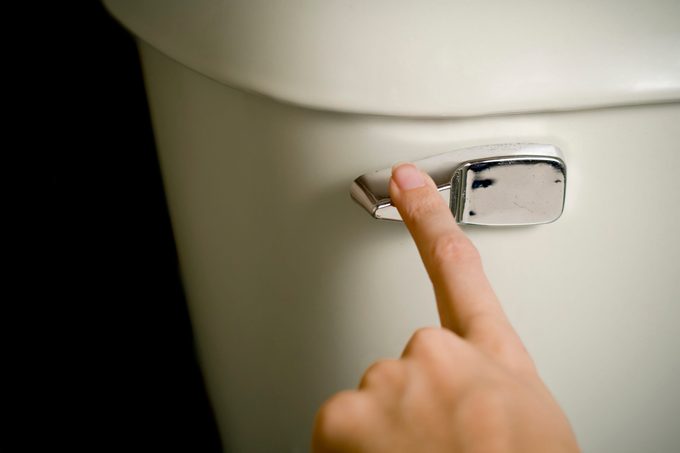Mucus in Stool: What’s Normal and What’s Not
Updated: Jun. 28, 2021
Mucus is naturally produced by your gastrointestinal tract, but if you can see it in your stool it can be a sign of an infection or inflammation.

If you make it a regular habit to peek at your poop—which we actually encourage you to do as one of those good toilet habits—then you might, on occasion, see a small amount of mucus either in the toilet or after you wipe. After all, our bodies naturally produce mucus, an egg-white-like substance that acts as a protective lining for the gastrointestinal (GI) tract and other organs, explains Shawn Khodadadian, MD, a gastroenterologist in private practice in New York City.
Most of that mucus remains in the GI tract, and whatever escapes the body is usually too insignificant to be seen by the naked eye. However, since mucus production increases with irritation or inflammation of the GI tract, it’s not a bad idea to do more research if you see mucus in your stool. Some causes are short-lived and may resolve on their own, like if you have had a bout of diarrhea or constipation.
However, any time you see a large amount of mucus in stool or if the mucus is persistent over a period of days and/or is accompanied by diarrhea, pain, or blood, it would be a good idea to check in with your doctor, advises Dr. Khodadadian. Here are some of the most common reasons for mucus in stool, ranging from a mild stomach virus to chronic conditions such as to irritable bowel syndrome (IBS).
You may have a food intolerance
Some people feel ill after eating certain foods, but the symptoms don’t indicate a more serious condition like celiac disease (more on that later) and it’s not considered a true food allergy. This is known as a food intolerance. (Here is the difference between a food intolerance and a food allergy).
People with food intolerances may experience mucus in their stool after eating the food to which they are intolerant, according to Jeffery Nelson, MD, colon and rectal surgeon and surgical director at The Center for Inflammatory Bowel and Colorectal Diseases at Mercy Hospital in Baltimore.
This is particularly true of people who have lactose intolerance, which is an inability to digest a sugar found in milk and other dairy products, or who have non-celiac gluten intolerance, which is a reaction to gluten, the proteins found in wheat and other cereal grains but also in trace amounts in many other types of food (and even some supplements).
When mucus in stool is associated with a food intolerance, it is common to also experience increased flatulence, abdominal discomfort, and diarrhea along with it.
You may have an intestinal infection
Intestinal infections or stomach bugs can be caused by a variety of bacteria, viruses, and parasites. They can be transmitted in a variety of ways, including via food, water, contact with infected persons, contact with something an infected person touched, or contact with animals, according to the Centers for Disease Control and Prevention (CDC). Intestinal infections that cause gastroenteritis, an inflammation of any part of the GI tract, are the most likely to present with mucus in the stool but they also tend to have other symptoms like nausea, diarrhea, and cramping. Some of the possible causes of infections include:
- Campylobacter bacteria, which cause traveler’s diarrhea. The germs can be transmitted via untreated water, in addition to ingestion of contaminated food or contact with infected animals.
- Shigella (which cases shigellosis), an extremely contagious type of bacteria that causes diarrhea. The germ can be transmitted via contaminated surfaces or by eating or drinking contaminated food or water.
- Whipworm, a parasite that infects as many as 795 million people in the world, is transmitted via ingestion of the parasite’s eggs. The eggs can be spread from the hand to the mouth after touching a contaminated surface and is more common in areas where hygiene is poor and there is a risk of contact with soil contaminated with human feces.
- Salmonella bacteria cause one of the most common forms of food poisoning, salmonellosis. Eating food contaminated with animal feces can be the culprit, as can handling some pets or animals without washing your hands afterwards, such as reptiles.
- Norovirus, another common germ that causes vomiting and diarrhea, can be spread from contaminated food or water, direct contact with a contaminated person, as well as using unwashed hands to eat or touch your mouth after contact with a contaminated surface.
You may have irritable bowel syndrome
Irritable bowel syndrome, also known as IBS, tends to be diagnosed when persistent or chronic gastrointestinal symptoms cannot be explained with any other diagnosis. These symptoms include:
IBS has been known to increase mucus production in patients whose primary complaint is diarrhea (as opposed to constipation), according to gastroenterologist, Jeffrey Hoberman, MD, in San Antonio, Texas.
However, the presence of mucus in stool along with other symptoms of IBS can also be a sign of other more serious conditions, such as inflammatory bowel disease.
You may have inflammatory bowel disease
Inflammatory bowel disease (IBD) refers to two conditions, Crohn’s disease and ulcerative colitis, that are characterized by chronic inflammation of the GI tract.
Unlike IBS, inflammatory bowel diseases are autoimmune conditions that can cause inflammation and damage to the intestines. While they can cause some symptoms that may seem like IBS (including stomach discomfort and diarrhea), inflammatory bowel diseases are distinct disorders and involve different treatments.
If you are experiencing mucus in your stool along with other ongoing symptoms like cramping and diarrhea or constipation, your doctor may consider the possibility of an inflammatory bowel disease, says Dr. Hoberman, especially if you’re also experiencing weight loss, fever, and symptoms of anemia.
Inflammatory bowel diseases can sometimes be diagnosed with diagnostic imaging whereas IBS cannot. Learn what’s different about ulcerative colitis vs. Crohn’s disease.
You may have celiac disease
Another possible cause of mucus in stool is celiac disease, according to Kavita Shanker-Patel, MD, a family practitioner with Northwestern Central DuPage Hospital, Chicago. Celiac disease is a relatively rare autoimmune condition in which the ingestion of even tiny amounts of gluten triggers an immune response that damages the small intestine.
Celiac disease symptoms include pain, cramping, diarrhea, fatigue, joint pain, and problems with the absorption of fat and other nutrients, which can cause malnutrition and pale and clay-colored stool.
You may have diverticulitis
Another possible explanation for mucus appearing in your stool could be that you have diverticulitis. In diverticulitis, weak spots deep in the wall of the intestine (usually but not always the large intestine) herniate and form pockets that protrude from the intestine. These pockets are called diverticula and cause no symptoms unless they become infected, which is known as diverticulitis.
One of the symptoms of diverticulitis, in addition to abdominal pain, constipation, diarrhea, and rectal bleeding, is mucus in the stool. (Check out the foods might help to prevent diverticulitis flareups.)
You may have an anal disorder
The anus is the last part of the GI tract through which stool passes before it exits the body. The following disorders of the anus can cause mucus to appear on the stool, along with red blood, according to Austin, Texas gastroenterologist, Harry Thomas, MD:
- Anal fissure, which is a split or tear in the lining of the anal wall
- Anal abscess, which is a swollen collection of pus near the anus
- Anal fistula, which is a narrow tunnel-like passageway left behind after an anal abscess drains
- Hemorrhoids, which are swollen blood vessels in the anus. When hemorrhoids become swollen, you may see a bloody discharge, but you’re also likely to feel pain upon relieving your bowels.
(Here are 11 health secrets your butt really wants to tell you.)
You may have colon or rectal cancer
Mucus in stool can sometimes be a symptom of colon cancer, says Dr. Shanker-Patel. However, mucus in stool is just one of a number of symptoms that might be observed in cases of colon cancer. (Here are 6 more symptoms of colon cancer to be aware of.)
Another possible cause: Cystic fibrosis
Cystic fibrosis is a genetic condition often associated with mucus discharge, Dr. Shanker-Patel explains, although not just from the GI tract, but also from the respiratory tract and even the reproductive tract. It’s typically diagnosed in childhood because it can have a major impact on the digestive and respiratory systems, and it can be potentially life threatening.
People with cystic fibrosis may also pass bulky, particularly foul-smelling oily stool. Cystic fibrosis is relatively rare, and affects about 30,000 people in the United States.























